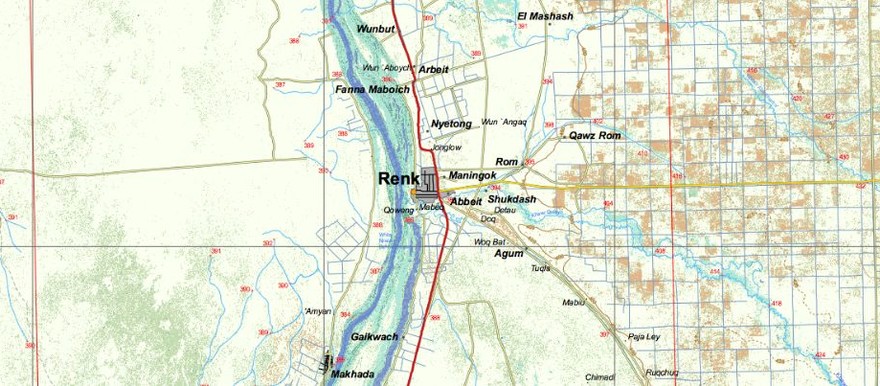Roman Catholic Auxiliary Bishop Daniel Adwok Marko Kur says that Renk is ‘deserted’ after civilians fled the town during fighting last week. He also confirms reports of the mass arming of tribal militia in the area.
Renk is a hub for river trade and agriculture, and is the northernmost town in South Sudan. The oil pipeline from Paloich passes close by the town.
After initial reports of the fall of the city last Wednesday, multiple media quoted Major General Garang Mabil as saying that there was a mutiny within the national army (SPLA) garrison in Renk that was quelled.
The rebels used a tactic that has been witnessed repeatedly since the start of the December conflict: Placing phone calls to troops and civilians on the other side of the front in order to spread fear and incite violence.
General Mabil explained to Sudan Tribune that some troops within the SPLA forces in Renk turned their guns on their comrades when they were told by phone that the town would come under attack by the rebels.
In a statement published on the website of the Comboni Missionaries, Bishop Daniel is quoted as saying that since these events there is now only army in town, while civilians have fled.
The town had been otherwise largely untouched by violence since the start of the conflict in the country in December 2013. The population of the county is nearly 140,000, according to the 2008 census, which means the clashes in the area will have significant humanitarian consequences.
On Saturday the UN aid coordination office in South Sudan reported, “Unconfirmed reports suggested that some 30,000 – 40,000 displaced people [from Renk County] are heading towards Melut fleeing fighting.”
The fact that the civilians are reported to be heading southward from Renk County toward Melut – which is also under threat from the south – rather than northward toward White Nile, which hitherto had been the main destination for displaced, suggests the newly displaced townsmen or villagers may be caught before a force advancing to the south.
SPLM/A-IO actually claimed last week to be advancing southward from Renk rather than pushing into the town. One of SPLM/A-IO senior military officers told Radio Tamazuj on Thursday that their forces captured villages including Molbok and Jelhak, which lie on the road south from Renk, suggesting the rebels moved southward toward the Paloich oil fields.
However, the SPLA spokesman Philip Aguer at the time denied this, telling Radio Tamazuj that the rebels did manage to infiltrate areas north of Renk, but were defeated.
Displacement from Renk toward the north was also reported on Friday, with witnesses in Joda telling Radio Tamazuj that huge crowds of people fled the city toward White Nile State. They confirmed that Renk remained under government control, but fears of fighting forced residents to flee.
Tribal militia
As described by the Catholic bishop, there are three armed groups operating in Renk and the surrounding area.
“One is the regular army of South Sudan (SPLA, predominantly formed by Nuer tribesmen). The second group is composed by the rebels of former vice-president Dr. Riek Machar,” reported the bishop, as quoted by the Comboni Missionaries.
“There is a third group formed by militia of the Dinka Abilang and Dingjol,” he reported, referring to armed civilians from the communities that live on the east bank of the Nile between Malakal and Renk.
Another informed source from the area confirmed to Radio Tamazuj that the Dinka youths of Melut have been mobilized en masse to defend the Paloich oil fields, estimating several thousands, including over 500 sent to defend Renk.
Bishop Daniel says the formation of the tribal militia represents “a new scenario that could cause many more conflicts” if Juba does not deal with the situation wisely.
He warns, “The Dinka militia could pose a threat to both rebels and SPLA.” The bishop did not clarify why the SPLA-backed militia would pose a threat to the SPLA, but possibly he meant to suggest that there could be violence between the armed Dinka civilians and the remaining loyalist Nuer troops serving in SPLA units in Renk.




